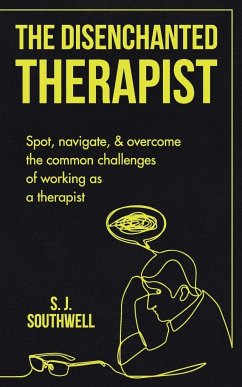As you have arrived at this book description it is likely that you are a therapist, or someone who is concerned about the wellbeing of therapists. If you are a therapist, then the chances are that you are struggling in some way. If so, you are not alone. Therapy is tremendously rewarding work. At the same time though, it is extraordinarily demanding. As a result, each year, many previously committed therapists burn out in their roles, or leave feeling discouraged and dispirited. This is a book for anyone whose voluntary or paid work involves elements of counselling or 'talk therapy'. The aim of this book is to help you spot, navigate, and overcome the common emotional challenges of counselling and therapy, so that you can continue to love the work, effectively support clients, and grow professionally and personally. Clinical psychologist and author, S. J. Southwell, draws on thirty years working in welfare, community, education, and mental health settings. She outlines the key personal, practical, and professional issues that contribute to therapist distress and disenchantment, and provides a wealth of suggestions to support therapists avoid or address the common challenges that arise on their professional journey. The first section encourages you to reflect on different aspects of your life that affect your work as a therapist. These include your habitual thinking patterns and responses, in Chapter 1, and your personal history and current physical and mental health, in Chapter 2. The second section takes a look at what happens in the therapy space, especially when it is likely to affect the wellbeing of the therapist. This includes Chapter 3, which explores the situations in which therapy tends to be particularly hard or slow, and Chapter 4, on three ways in which client work can have particularly powerful and disturbing effects on therapists, transference and countertransference, vicarious trauma, and moral injury. The final section addresses broader aspects of our professional experience, including our work context, in Chapter 5. The remaining chapters in this section address professional crises, including taking on too much client work too soon, and burnout, in Chapter 6, and professional crises of faith, in Chapter 7. The book assumes that if you are having struggles in these areas, you have already set aside time to reflect, that you are using all the therapeutic strategies and skills you have available to support yourself, that you have clinical supervision, you are engaging in regular and appropriate professional development training, and that you have a self-care plan. Of course, it is much easier to write this list of essentials than it is for anyone to put them all in place. They are so important that we return to them in the final chapter, Chapter 8, with some practical suggestions for how to consolidate your practice in these areas.
Hinweis: Dieser Artikel kann nur an eine deutsche Lieferadresse ausgeliefert werden.
Hinweis: Dieser Artikel kann nur an eine deutsche Lieferadresse ausgeliefert werden.








